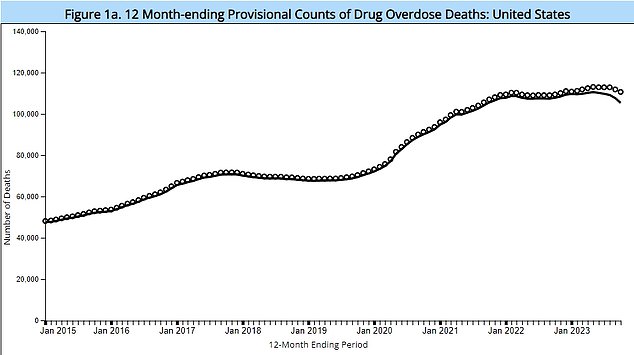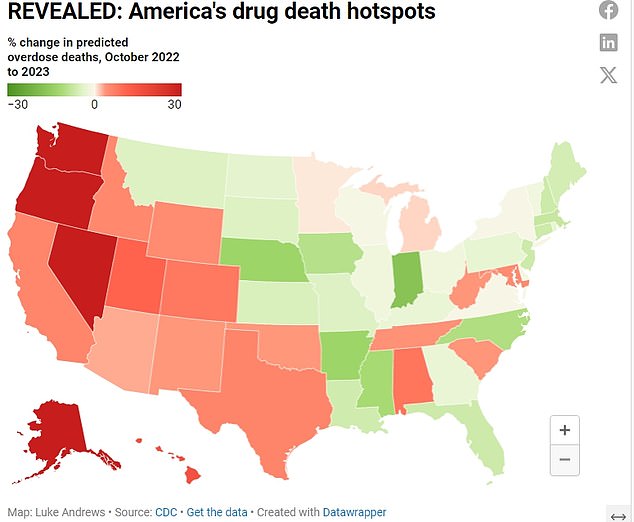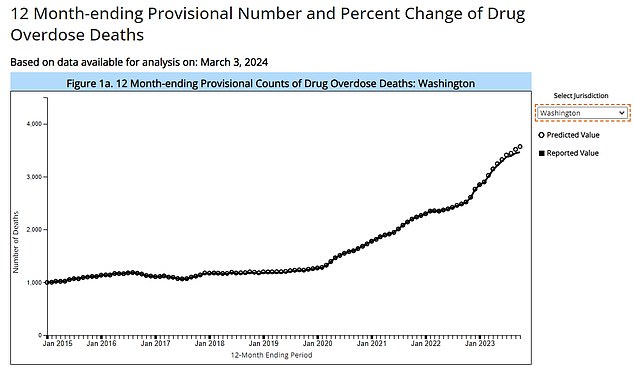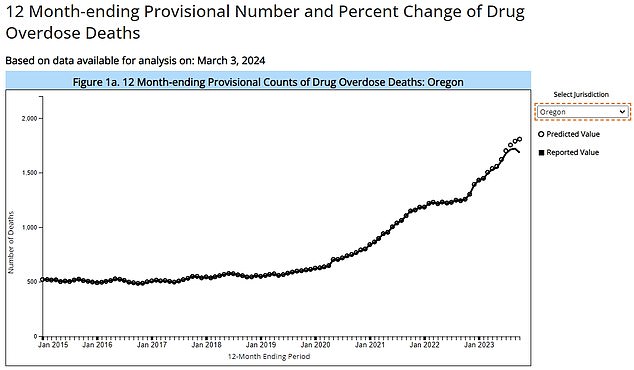America’s drug epidemic shows no signs of slowing down, as new data reveals that fatal overdoses have risen again over the past year.
A CDC report showed there was a 1.1 percent increase in overdose deaths nationwide between the year to October 2022 and October 2023, from 109,400 to 110,600 deaths.
Twenty-one states saw an increase in overdose deaths in the past year — with Oregon, which has been experimenting with drug decriminalization, seeing the largest increase in deaths (44 percent).
The US is in the middle of one overdose epidemic mainly driven by the spread of fentanyl, which is up to 50 times more potent than heroin and lethal to adults in even small doses. Another lethal tranquilizer known as ‘tranq’ has also started to appear in illicit supplies.
Your browser does not support iframes.

Data shows overdose deaths have fallen slightly month-on-month but are still higher in the year to October 2023 than the same period last year


In the photo above, a man is seen taking drugs on the street in San Francisco
The CDC estimates drug overdose deaths based on reports from state health authorities for this year and previous years.
It avoids using preliminary counts from states because these are often incomplete due to the time it takes to record and confirm an overdose death.
By state, Oregon saw the sharpest increase in overdose deaths during the period — with deaths ranging from 1,230 to 1,800 deaths per year.
Washington recorded the second largest increase in deaths by 41 percent, from 2,520 to 3,570 deaths, followed by Alaska, which rose 35 percent, from 240 to 324.
Washington State’s Democratic Governor Jay Inslee said at a press conference late last year: ‘A pill can now kill you. Fentanyl is the nuclear weapon of drugs and we need to step up our fight against this scourge.’
At the other end of the scale, Indiana saw the sharpest drop in overdose deaths, falling 17 percent on the year to 2,250 from 2,730 a year.
It was followed by Nebraska, which saw a 13 percent drop from 210 to 183, and Arkansas, which also saw a 13 percent drop from 615 to 536.


The above map shows the percentage change in overdose deaths by state between the 12 months to October 2022 and the same period to October 2023


The graph above shows overdose deaths for the state of Washington, which are beginning to rise rapidly


This graph shows overdose deaths in Oregon, which decriminalized drugs, have also been increasing in recent months. Data is still preliminary
While the numbers for the past year are still preliminary, they highlight how many states are still facing an increase in drug-related deaths.
In 2022, the most recent year with complete data, 109,360 people died of drug overdoses in the United States.
This was an increase of almost two percent on the previous year and 54 percent on five years ago, when 70,000 people died of overdoses.
Since the CDC began releasing data in 2015, opioids have been the leading cause of drug overdose death.
After opioids, psychostimulants — a class of drugs including cocaine and methamphetamine — have been the second biggest killers.
Health and addiction experts refer to the drug epidemic in ‘waves’.
The United States is currently in what is considered the “fourth wave” of the crisis, which began in the late 1990s with the advent of potent prescription pills such as OxyContin.
The latest wave began to rise in 2015, about two years after fentanyl overtook heroin as the most lethal opioid.
Now, still fueled by fentanyl, it is being compounded with newer drugs like xylazine – sometimes referred to as ‘tranq’.
Doctors on the scene fear the potential death rate could continue to rise as people unknowingly take other drugs laced with tranq — a deadly sedative — that doesn’t respond to the life-saving reversal drug Narcan, used for opioid overdoses.

